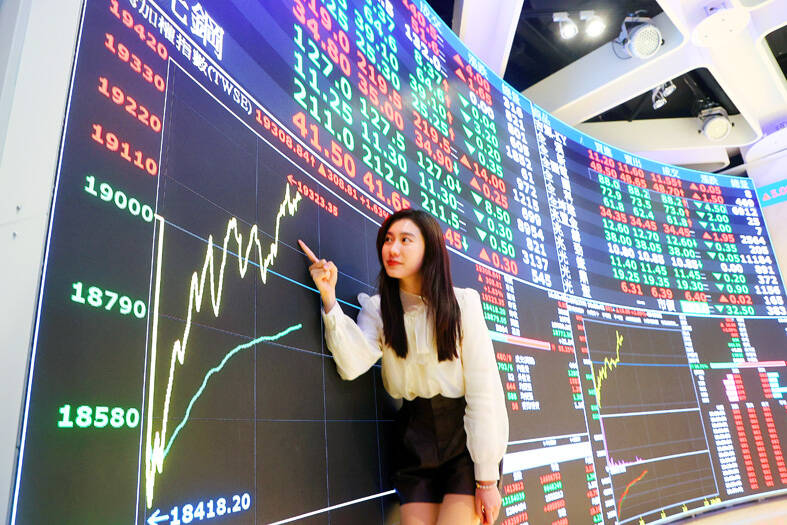Taiwanese stocks are expected to continue to rebound today after the US over the weekend announced a new list of goods to be exempted from the White House’s latest round of tariffs, including smartphones, PCs, servers, chipmaking equipment and other consumer electronics, analysts said yesterday.
Although the US Customs and Border Protection Agency’s announcement is to be a huge boon to Taiwan’s contract electronics makers, investors should continue to monitor tariff changes and negotiations between the US and its trading partners, analysts said.
“Will the market react to the good news for just one session, or will it continue to rise over the following sessions to erase some of the market’s previous losses? That might require further observation as many variables remain,” senior stock analyst Lu Han-wei (呂漢威) told TTV News.

Photo: CNA
The TAIEX closed at 19,528.77 points on Friday, for a weekly decrease of 1,769.45 points, or 8.31 percent, over an extremely volatile week that saw the intervention of the state-run National Stabilization Fund and a 90-day tariff pause announced by US President Donald Trump.
Over the same period, Hong Kong’s Hang Seng Index fell 8.47 percent, China’s Shanghai Composite index lost 3.11 percent, South Korea’s KOSPI Composite index fell 1.33 percent and Japan’s Nikkei 225 declined 0.58 percent.
“The impact of tariffs is wider than expected, and the reaction in the stock market tends to be more volatile in the short term,” Allianz Global Investors Taiwan Ltd’s (安聯投信) Taiwan equity research team said in a note on Friday. “Considering the various effects of US tariffs on different industries, investors need to remain flexible and stay vigilant to US policy changes.”
The biggest global exemption under the new guidance from the US government is the category that includes PCs and servers, with US$140 billion in imports last year, Barron’s magazine reported on Saturday.
The exemptions cover 64 percent of US imports from Taiwan, 44 percent from Malaysia, 29 percent from Vietnam and Thailand, and 23 percent from China, the report said.
While the development over the weekend takes some pressure off the market, the Trump administration’s anticipated tariff changes in the coming days leaves uncertainty in the market in the near term and investors should not take that lightly, analysts said.
In addition, investors are expected to watch closely Taiwan Semiconductor Manufacturing Co’s (台積電) earnings conferences on Thursday, as it is expected to focus on the impact of US tariffs on the company’s operations, the effects of geopolitical changes on its capital spending plans, and its profit and investment prospects, analysts added.

To many, Tatu City on the outskirts of Nairobi looks like a success. The first city entirely built by a private company to be operational in east Africa, with about 25,000 people living and working there, it accounts for about two-thirds of all foreign investment in Kenya. Its low-tax status has attracted more than 100 businesses including Heineken, coffee brand Dormans, and the biggest call-center and cold-chain transport firms in the region. However, to some local politicians, Tatu City has looked more like a target for extortion. A parade of governors have demanded land worth millions of dollars in exchange

Hong Kong authorities ramped up sales of the local dollar as the greenback’s slide threatened the foreign-exchange peg. The Hong Kong Monetary Authority (HKMA) sold a record HK$60.5 billion (US$7.8 billion) of the city’s currency, according to an alert sent on its Bloomberg page yesterday in Asia, after it tested the upper end of its trading band. That added to the HK$56.1 billion of sales versus the greenback since Friday. The rapid intervention signals efforts from the city’s authorities to limit the local currency’s moves within its HK$7.75 to HK$7.85 per US dollar trading band. Heavy sales of the local dollar by

Taiwan Semiconductor Manufacturing Co’s (TSMC, 台積電) revenue jumped 48 percent last month, underscoring how electronics firms scrambled to acquire essential components before global tariffs took effect. The main chipmaker for Apple Inc and Nvidia Corp reported monthly sales of NT$349.6 billion (US$11.6 billion). That compares with the average analysts’ estimate for a 38 percent rise in second-quarter revenue. US President Donald Trump’s trade war is prompting economists to retool GDP forecasts worldwide, casting doubt over the outlook for everything from iPhone demand to computing and datacenter construction. However, TSMC — a barometer for global tech spending given its central role in the

The Financial Supervisory Commission (FSC) yesterday met with some of the nation’s largest insurance companies as a skyrocketing New Taiwan dollar piles pressure on their hundreds of billions of dollars in US bond investments. The commission has asked some life insurance firms, among the biggest Asian holders of US debt, to discuss how the rapidly strengthening NT dollar has impacted their operations, people familiar with the matter said. The meeting took place as the NT dollar jumped as much as 5 percent yesterday, its biggest intraday gain in more than three decades. The local currency surged as exporters rushed to